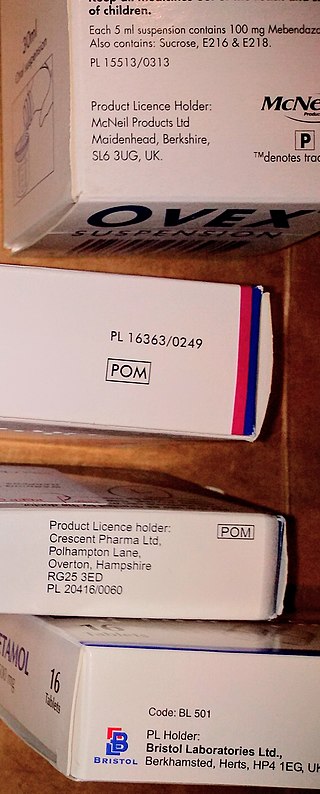Related Research Articles
The United States Food and Drug Administration is a federal agency of the Department of Health and Human Services. The FDA is responsible for protecting and promoting public health through the control and supervision of food safety, tobacco products, caffeine products, dietary supplements, prescription and over-the-counter pharmaceutical drugs (medications), vaccines, biopharmaceuticals, blood transfusions, medical devices, electromagnetic radiation emitting devices (ERED), cosmetics, animal foods & feed and veterinary products.

Pfizer Inc. is an American multinational pharmaceutical and biotechnology corporation headquartered at The Spiral in Manhattan, New York City. The company was established in 1849 in New York by two German entrepreneurs, Charles Pfizer (1824–1906) and his cousin Charles F. Erhart (1821–1891).

A generic drug is a pharmaceutical drug that contains the same chemical substance as a drug that was originally protected by chemical patents. Generic drugs are allowed for sale after the patents on the original drugs expire. Because the active chemical substance is the same, the medical profile of generics is equivalent in performance compared to their performance at the time when they were patented drugs. A generic drug has the same active pharmaceutical ingredient (API) as the original, but it may differ in some characteristics such as the manufacturing process, formulation, excipients, color, taste, and packaging.
Prescription drug list prices in the United States continually are among the highest in the world. The high cost of prescription drugs became a major topic of discussion in the 21st century, leading up to the American health care reform debate of 2009, and received renewed attention in 2015. One major reason for high prescription drug prices in the United States relative to other countries is the inability of government-granted monopolies in the American health care sector to use their bargaining power to negotiate lower prices, and the American payer ends up subsidizing the world's R&D spending on drugs.

A prescription drug is a pharmaceutical drug that is permitted to be dispensed only to those with a medical prescription. In contrast, over-the-counter drugs can be obtained without a prescription. The reason for this difference in substance control is the potential scope of misuse, from drug abuse to practicing medicine without a license and without sufficient education. Different jurisdictions have different definitions of what constitutes a prescription drug.
Pharmaceutical marketing is a branch of marketing science and practice focused on the communication, differential positioning and commercialization of pharmaceutical products, like specialist drugs, biotech drugs and over-the-counter drugs. By extension, this definition is sometimes also used for marketing practices applied to nutraceuticals and medical devices.
Single-payer healthcare is a type of universal healthcare in which the costs of essential healthcare for all residents are covered by a single public system.
Pharmacovigilance, also known as drug safety, is the pharmaceutical science relating to the "collection, detection, assessment, monitoring, and prevention" of adverse effects with pharmaceutical products. The etymological roots for the word "pharmacovigilance" are: pharmakon and vigilare. As such, pharmacovigilance heavily focuses on adverse drug reactions (ADR), which are defined as any response to a drug which is noxious and unintended, including lack of efficacy. Medication errors such as overdose, and misuse and abuse of a drug as well as drug exposure during pregnancy and breastfeeding, are also of interest, even without an adverse event, because they may result in an adverse drug reaction.

Sibutramine, formerly sold under the brand name Meridia among others, is an appetite suppressant which has been discontinued in many countries. It works as a serotonin–norepinephrine reuptake inhibitor similar to a tricyclic antidepressant. Until 2010, it was widely marketed and prescribed as an adjunct in the treatment of obesity along with diet and exercise. It has been associated with increased cardiovascular diseases and strokes and has been withdrawn from the market in 2010 in several countries and regions including Australia, Canada, China, the European Union, Hong Kong, India, Mexico, New Zealand, the Philippines, Thailand, the United Kingdom, and the United States. However, the drug remains available in some countries.
The pharmaceutical industry is one of the leading industries in the People's Republic of China, covering synthetic chemicals and drugs, prepared Chinese medicines, medical devices, apparatus and instruments, hygiene materials, packing materials, and pharmaceutical machinery. China has the second-largest pharmaceutical market in the world as of 2017 which is worth US$110 billion. China accounts for 20% of the world's population but only a small fraction of the global drug market. China's changing health-care environment is designed to extend basic health insurance to a larger portion of the population and give individuals greater access to products and services. Following the period of change, the pharmaceutical industry is expected to continue its expansion.
An online pharmacy, internet pharmacy, or mail-order pharmacy is a pharmacy that operates over the Internet and sends orders to customers through mail, shipping companies, or online pharmacy web portal.
A patient safety organization (PSO) is a group, institution, or association that improves medical care by reducing medical errors. Common functions of patient safety organizations are data collection, analysis, reporting, education, funding, and advocacy. A PSO differs from a Federally designed Patient Safety Organization (PSO), which provides health care providers in the U.S. privilege and confidentiality protections for efforts to improve patient safety and the quality of patient care delivery

For health issues in Iran see Health in Iran.

Naratriptan (trade names include Amerge) is a triptan drug marketed by GlaxoSmithKline and is used for the treatment of migraine headaches. It is a selective 5-HT1 receptor subtype agonist.
A counterfeit medication or a counterfeit drug is a medication or pharmaceutical item which is produced and sold with the intent to deceptively represent its origin, authenticity, or effectiveness. A counterfeit drug may contain inappropriate quantities of active ingredients, or none, may be improperly processed within the body, may contain ingredients that are not on the label, or may be supplied with inaccurate or fake packaging and labeling.

The Ministry of Health and Medical Education (MOHME) has executive responsibility for health and medical education within the Iranian government. The MOHME comprises five departments headed by deputy ministers: Health, Research & Technology, Education, Logistics, Food & Drugs.

Healthcare in the United States is largely provided by private sector healthcare facilities, and paid for by a combination of public programs, private insurance, and out-of-pocket payments. The U.S. is the only developed country without a system of universal healthcare, and a significant proportion of its population lacks health insurance. The United States spends more on healthcare than any other country, both in absolute terms and as a percentage of GDP; however, this expenditure does not necessarily translate into better overall health outcomes compared to other developed nations. Coverage varies widely across the population, with certain groups, such as the elderly and low-income individuals, receiving more comprehensive care through government programs such as Medicaid and Medicare.
Pharmaceutical fraud is when pharmaceutical companies engage in illegal, fraudulent activities to the detriment of patients and/or insurers. Examples include counterfeit drugs that do not contain the active ingredient, false claims in packaging and marketing, suppression of negative information regarding the efficacy or safety of the drug, and violating pricing regulations.
Specialty drugs or specialty pharmaceuticals are a recent designation of pharmaceuticals classified as high-cost, high complexity and/or high touch. Specialty drugs are often biologics—"drugs derived from living cells" that are injectable or infused. They are used to treat complex or rare chronic conditions such as cancer, rheumatoid arthritis, hemophilia, H.I.V. psoriasis, inflammatory bowel disease and hepatitis C. In 1990 there were 10 specialty drugs on the market, around five years later nearly 30, by 2008 200, and by 2015 300.
The distribution of medications has special drug safety and security considerations. Some drugs require cold chain management in their distribution.
References
- 1 2 "Center for Medicine in the Public Interest" (PDF). Foundation Center. Retrieved 23 March 2017.
- ↑ Herper, Matthew (2007-07-25). "The Nissen Doctrine". Forbes. Archived from the original on March 11, 2008. Retrieved 2008-01-14.
- ↑ Lee Fang (Nov 18, 2009). "Exclusive: Attacks On Health Reform Orchestrated By Yet Another Shadowy Corporate Front Group — 'CMPI'". Center for American Progress . Retrieved 19 November 2009.
- ↑ Goldberg, Robert (2006-12-25). "HillaryCare Comes Back". The Weekly Standard. News America Incorporated. Archived from the original on May 20, 2011. Retrieved 2008-01-14.
- ↑ Pitts, Peter J. (2006-04-12). "Power to the Patients". The Wall Street Journal . Retrieved 2008-01-14.
- ↑ "USA healthcare: FDA centenary prompts politicking". Economist Intelligence Unit. Economist Group. 2006-07-05. Retrieved 2008-01-14.
- ↑ "Home". biggovhealth.com.
- ↑ "Site attacks single-payer health care - POLITICO". Politico .
- ↑ "Proposed drug importation bill would expose Americans to counterfeit meds". 23 January 2019.
- ↑ Jason Lee Miller (2008-08-01). "Are Google Results Hazardous To Your Health?". WebProNews. iEntry, Inc. Archived from the original on 2008-01-12. Retrieved 2008-01-14.
- ↑ "Site attacks single-payer health care - POLITICO". Politico .
- ↑ Laurie Sullivan (2006-06-13). "Pharmaceuticals Slowly Adopting RFID To Protect Prescription Drug Supplies". Information Week. CMP Media LLC. Retrieved 2008-01-14.